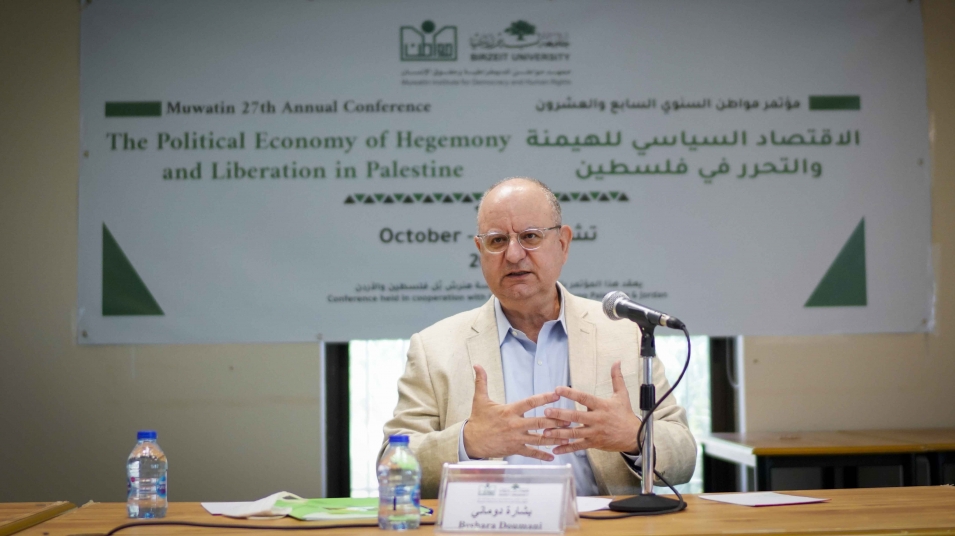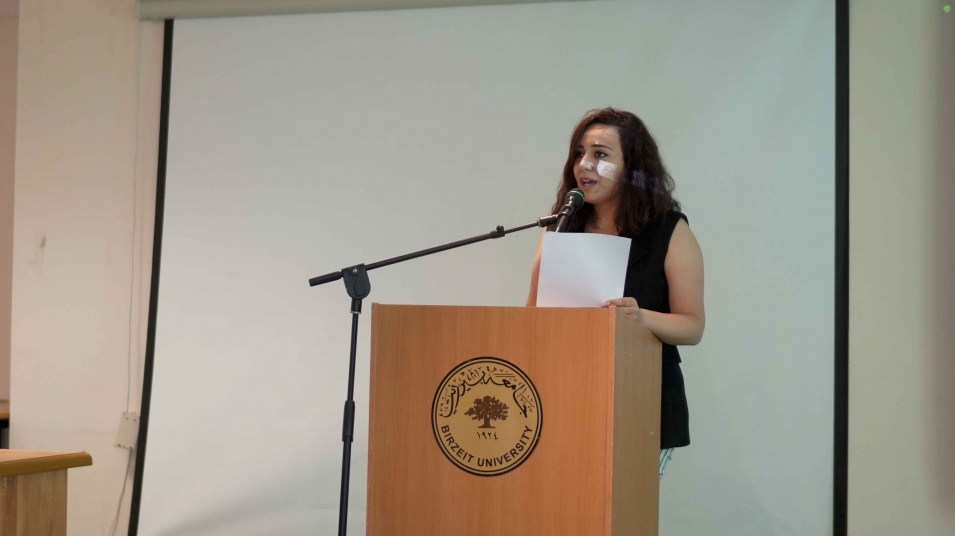Muwatin's 27th conference grapples with political economy, settler-colonialism and the liberation project in Palestine
Palestinian and international academics, researchers, and political science experts explored the nature and prospects of the Palestinian national project in the 27th Muwatin annual conference, held under the title “The Political Economy of Hegemony and Liberation in Palestine,” on October 1-2, 2021, on Birzeit University’s campus and online through videoconferencing technology.
Organized by Birzeit University’s Muwatin Institute for Democracy and Human Rights together with the Henrich Boel Stiftung in Palestine and Jordan, the conference tackled the need to build a renewed vision for Palestine’s national project on three levels: the conflicts and coalitions of hegemonic forces; the conflicts and coalitions of emancipatory forces; and the antagonisms between the hegemonic and emancipatory forces, as well as the existence of colonial and neo-colonial proxies among the colonized and the existence of emancipatory forces amidst the colonizers.
In his welcoming remarks, Birzeit University President Dr. Beshara Doumani stressed the importance of approaching the Palestinian national project from a political-economic perspective. He noted that, especially in Palestine, the production and dissemination of knowledge constitute important battlegrounds for anti-colonial struggles, adding that Birzeit University, as the foremost higher educational institution in Palestine, has a special duty to produce justice-driven knowledge within the hegemony of capitalism.
Director of the Muwatin Institute for Democracy and Human Rights Mudar Kassis presented the conference’s key objectives. First, presenting a political-economic perspective to the prospects of and vision for the Palestinian national project, which entails a broader understanding of the Palestinian cause and its liberation project. Second, examining the real forces that produce liberation or hegemony, which include - according to Kassis - subjective-cognitive knowledge and the political economy. The third goal of the conference is to discuss how the absence of concrete liberation strategies affects the nature and prospects of Palestine’s national project.
Chaired by Rana Barakat, a professor of history and archeology and the Director of Birzeit University’s Museum, the first session revolved around the economy of colonization. The first paper on “Settler Colonialism and Military-Security Production in Israel,” presented by Tariq Da’na, an assistant professor of conflict and humanitarian studies at the Doha Institute for Graduate Studies, reviewed through a political-economic perspective the organic relationship between high-tech production in the Israeli military-security sectors, the structure of settler colonialism, and the continuing occupation of Palestinian lands. He argued that the rise of Israel as a global leader of military and security innovation constituted one of the pillars of strength in the Zionist ideology that revolves around expanding its colonial projects.
Introducing “The Reality of the Palestinian Labour Force,” Lamees Farraj, a researcher in economic and development policies at Al-Shabaka: The Palestinian Policy Network, analyzed the composition of labor in Palestine and the mechanisms of controlling the source of livelihood as a tool for a bargain. Farraj explained the use of economic tools by colonial powers , such as conditional aid and granting permits to workers, led to curbing and thwarting the Palestinian struggle towards liberation.
In the final paper, Tareq Sadeq, a faculty member at the Department of Economics at Birzeit University, discussed the suppression of Palestinians and the commodification of their rights through a set of policies adopted by the colonial regime constituting an environment that expels Palestinians from their land. Sadeq examined in his paper how tightening and controlling the Palestinian economy helped destroy its infrastructure, besiege the remaining Palestinian-populated areas, and create a dependency on the Israeli economy, which benefits the Israeli colonial project.
The second session, “The Economy of Politics in Palestine,” was chaired by Ghassan Khatib, Birzeit’s Vice President for Advancement and a faculty member at the Department of Philosophy and Cultural Studies. In this session, the participants presented three papers on “The Political Economy of the PLO Crisis,” “Corruption in the Management of Palestinian Natural Resources,” and “The Political Economy of Palestinian Political Islam.”
The first paper, by Basem Ezbidi, a faculty member at the Department of Political Science who also teaches at the Muwatin institute, reviews the impact of political economy on the program and strategy of the Palestinian Liberation Organization, arguing that the PLO is corrupted by political money and has itself become in dire need of liberation. Isam Haj Hussein, the executive director of the Coalition for Integrity and Accountability (AMAN), discussed the management of Palestinian natural resources, and corruption therein, by highlighting the forms of corruption and its relations to the economy of the Israeli occupation, in addition to the control, influence, and exclusivity of relevant decisions by influential Palestinian parties.
The third session, by Oraib Al Rantawi, director of Al Quds Center for Political Studies, explored the role of political Islam in building civil finance networks and their impact on providing “sustainability” and margins of “independence,” and “finance and regional alliances.”
Concluding the first day of the conference, keynote speaker Walter Mignolo, the William Hane Wannamaker Distinguished Professor of Romance Studies at Duke University, explored the “Question of Palestine in the Colonial Horizon of Modernity,” explaining how settler-colonialism is linked to modernity, and how it shapes or deconstruct Palestinian nationalism.









